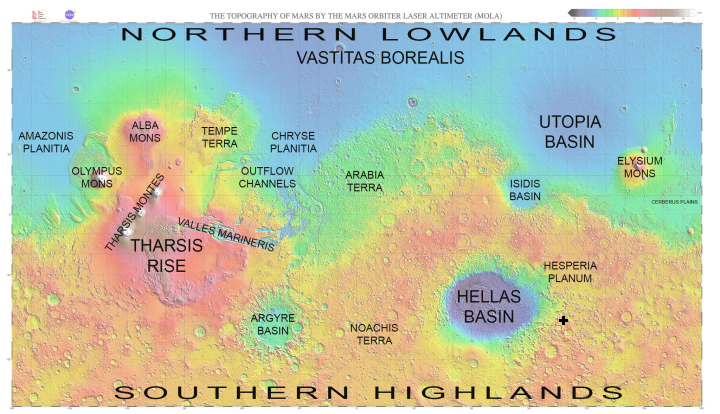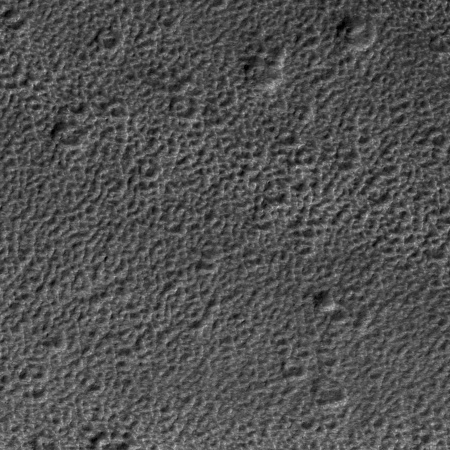A vegetable grater on Mars
Cool image time! I honestly can’t think of any better term but “vegetable grater” to describe the strange surface in the image on the right, cropped from the full sized image that was released with the July 11, 2018 monthly release of new images from the high resolution camera on Mars Reconnaissance Orbiter (MRO).
If you click on the image you can see the whole image, which merely shows more of the same terrain over a wider area. When I cropped it, I literally picked a random 450×450 pixel-sized area, since other than slight variations the entire terrain in the full image is as equally rough. The resolution captures objects as big as five feet across.
Looking at the full image there does seem to be flow patterns moving across the middle of the image, but if so these flow patterns had no effect on the surface roughness, other than indicating a very slight difference in the size of the knobs and pits. Overall, very strange.
The location of this place on Mars is in the cratered southern highlands, to the southwest of Hellas Basin, as indicated by the black cross in the image below.

This is an area that has not been imaged very much in high resolution. Large swathes of terrain have never been looked at closely. Mars Global Surveyor took an image here, covering a wider area, all of which only looked exactly the same. Other orbiters have either not had as good a resolution, or did not image the area at all.
Thus, to gain any understanding of this terrain is made even more difficult because there is no larger understanding of its geological context.
What we can say is this terrain certainly fits the definition of “badlands.” Travel here were be difficult at best. Nothing is smooth or easy to traverse. And the landmarks all look the same. Getting lost would be very very easy to do.
I have previously highlighted an image of the vast dune fields of Mars that are as difficult to explore. Both illustrate the exciting challenges for future generations. The universe insists on making things hard. It is when we rise to accept that challenge that we as humans begin to do great things.
On Christmas Eve 1968 three Americans became the first humans to visit another world. What they did to celebrate was unexpected and profound, and will be remembered throughout all human history. Genesis: the Story of Apollo 8, Robert Zimmerman's classic history of humanity's first journey to another world, tells that story, and it is now available as both an ebook and an audiobook, both with a foreword by Valerie Anders and a new introduction by Robert Zimmerman.
The print edition can be purchased at Amazon or from any other book seller. If you want an autographed copy the price is $60 for the hardback and $45 for the paperback, plus $8 shipping for each. Go here for purchasing details. The ebook is available everywhere for $5.99 (before discount) at amazon, or direct from my ebook publisher, ebookit. If you buy it from ebookit you don't support the big tech companies and the author gets a bigger cut much sooner.
The audiobook is also available at all these vendors, and is also free with a 30-day trial membership to Audible.
"Not simply about one mission, [Genesis] is also the history of America's quest for the moon... Zimmerman has done a masterful job of tying disparate events together into a solid account of one of America's greatest human triumphs."--San Antonio Express-News



Kind of looks like an orange peel.
wodun: Heh. You are right on the money. I should’ve seen that. Much better than my analogy.